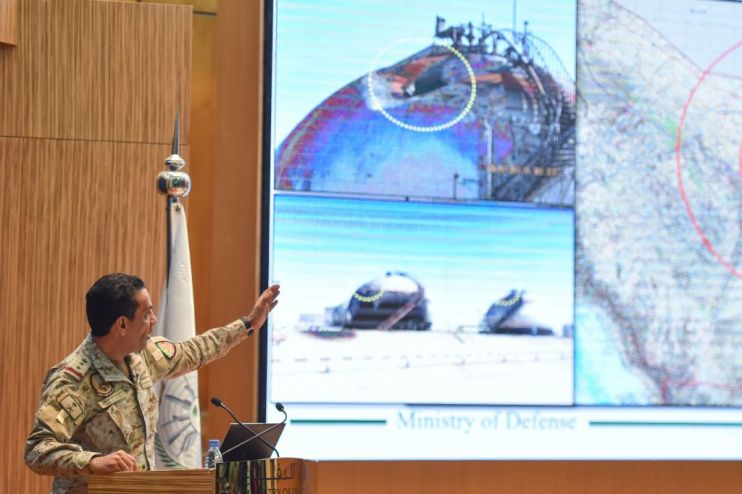The west can no longer afford to ignore Iranian aggression

The most curious question about last weekend’s destruction of Saudi Arabian oil infrastructure was not who carried it out, or even how, but why it occurred at this particular juncture.
Saudi Arabia and Iran – the almost-certain aggressor given both intent and ability to carry out such an attack – have been shadow boxing with each other for some years in pursuit of the goal of Middle Eastern hegemony.
Proxy wars in Yemen and Syria, and the battle for influence in Iraq and Lebanon, are an established feature of the contemporary Middle Eastern reality.
But thus far, the Sunni and Shia heavyweights had maintained a respectful distance when it came to attacks on each other’s soil. This uneasy truce has now been shattered, and the ramifications extend far beyond the immediate Gulf region, to the UK and across the west.
For in striking Saudi Arabia – either by itself or using a catspaw like Yemen’s Houthi rebels – Iran has shown a concerning trait that augurs badly for the stability of this most volatile of regions, and therefore the security of global oil supply that we depend on.
A country which has long been the subject of opprobrium for its sponsoring of international terrorism, interventionism in other countries, and flouting of international nuclear norms is now doubling down on an aggressive approach, rather than rowing back to placate the court of global public opinion.
In one sense, this should come as no surprise. The Islamic Republic of Iran is in its fortieth year, and one of the many constants during its time in existence has been that every overseas opportunity to expand Iranian power and authority must be taken.
Such tactics have been seen most blatantly in Syria, where Iran has sacrificed considerable blood and treasure to prop up Bashar al-Assad’s murderous regime so that it can maintain a client state, but also menace Israel by moving forces within striking distance of a Jewish state it has pledged to eradicate.
Taken this way, Iran’s extension of its sphere of military operations seems natural: an opportunity existed to strike directly at a foe and cause it significant economic damage, and the mullahs did not hesitate to seize it.
But Iran’s move is, at the same time, a mystifying one. For the past year, the country has been playing off the European signatories to the Joint Comprehensive Plan of Action (known as the Iran Deal) regulating its illicit nuclear ambitions against the US, following the latter’s withdrawal from it.
Iran has been so successful in its approach that it has not only persuaded Germany, France and the UK to stick with the treaty – thereby increasing tensions with Washington – but also to build an entirely new international payments system to bypass US secondary sanctions.
For the country to now place European collaboration in jeopardy by undertaking an attack on a processing site and oilfield responsible for five per cent of global oil supply, and thereby driving up the international oil price and damaging growth prospects in our economies, is an audacious gambit.
Equally, this incident occurred at an unusual time in Iranian-US relations. With talk about President Trump wanting a direct face-to-face meeting with Iran’s President Rouhani in the margins of the upcoming UN General Assembly session, and the recent departure of the hawkish US national security adviser John Bolton, a thawing in climate between the old enemies had seemed possible.
With the US having now published evidence of Iranian involvement in the oilfield episode, their cold war has most firmly been resumed.
The only logical conclusion is that Iran has sensed an opportunity to change tack definitively from compliance to confrontation, rather than running both simultaneously.
Saudi Arabia was the immediate target of the assault, given the damage that Iran has been able to inflict upon the imminent Saudi attempt to float part of its Aramco oil empire, which will now almost certainly be delayed.
But we should be under no illusions about whether Iran is aware of western dependence on oil and of the inflationary and growth knock-on effects driven by oil price spikes, and that our own national security is therefore being undermined through such tactics.
Regrettably, the UK has been complicit to date in allowing Iran to think that it can get away with such behaviour. Mounting Iranian breaches of the Iran Deal have been ignored, and hostage-taking and tanker shenanigans responded to with little more than mealy-mouthed expressions of outrage.
It may well be true that Brexit issues are taking up all of our diplomatic bandwidth, but if so, this is occurring at a terrible price to British prestige and influence.
Iran is not simply a British problem, as the global shockwaves that have reverberated from this incident have shown. But if now is not the time to stand with our American allies and those in the Middle East directly in the Iranian line of fire, then it is difficult to conceive when will be.
And we will only have ourselves to blame when Iran’s next stratagem proves even more harmful to British interests.
Main image credit: Getty